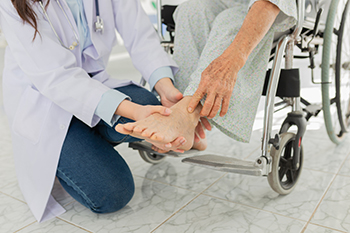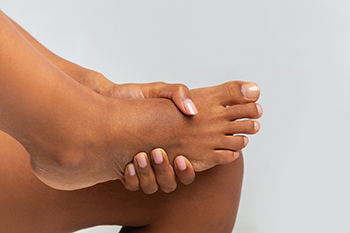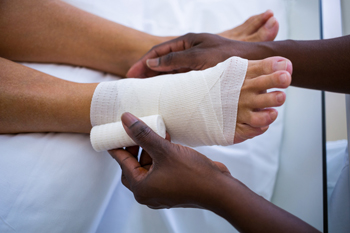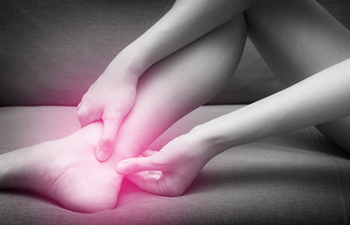September 2023
Foot Care and Falls Prevention

When considering the well-being of elderly loved ones, it is essential not to overlook the health of their feet, as they play a vital role in supporting their mobility. Foot problems among seniors are common and often associated with weakness, altered gait, and balance difficulties, which can increase the risk of falls. Various foot issues can affect older individuals and can include corns, calluses, and toenail disorders. Additionally, bunions and deformities such as hammertoe and claw toe may develop. Loss of fat pads and connective tissue disorders can also lead to discomfort. Poor circulation and systemic conditions, such as diabetes and arthritis, can further compound foot problems. Proper elderly foot care involves regular checks for changes in foot health, maintaining cleanliness, and ensuring proper footwear fit. Orthotics can help alleviate foot pain and reduce fall risks in the elderly as well. If you are elderly or taking care of a senior, it is suggested that you make an appointment with a podiatrist to help maintain regular foot care, in addition to providing advice on effective fall prevention techniques.
Proper foot care is something many older adults forget to consider. If you have any concerns about your feet and ankles, contact one of our podiatrists from Bazzi Podiatry. Our doctors can provide the care you need to keep you pain-free and on your feet.
The Elderly and Their Feet
As we age we start to notice many changes in our body, but the elder population may not notice them right away. Medical conditions may prevent the elderly to take notice of their foot health right away. Poor vision is a lead contributor to not taking action for the elderly.
Common Conditions
- Neuropathy – can reduce feeling in the feet and can hide many life-threatening medical conditions.
- Reduced flexibility – prevents the ability of proper toenail trimming, and foot cleaning. If left untreated, it may lead to further medical issues.
- Foot sores – amongst the older population can be serious before they are discovered. Some of the problematic conditions they may face are:
- Gouging toenails affecting nearby toe
- Shoes that don’t fit properly
- Pressure sores
- Loss of circulation in legs & feet
- Edema & swelling of feet and ankles
Susceptible Infections
Diabetes and poor circulation can cause general loss of sensitivity over the years, turning a simple cut into a serious issue.
If you have any questions please feel free to contact one of our offices located in Detroit, West Detroit, Northwest Detroit, Sterling Heights, Hamtramck and Dearborn Heights, MI . We offer the newest diagnostic and treatment technologies for all your foot and ankle needs.
Managing Foot Pain

The management of foot pain is extremely individualized, depending on its cause. Patients typically combine non-pharmaceutical methods with medications for relief. Performing specific exercises that maintain muscle strength and flexibility can help to prevent future injuries. Podiatrists are essential and can offer orthotics tailored to each patient's needs. These insoles, rigid or soft, alleviate walking or running discomfort. Medications come in various forms including oral analgesics and corticosteroid injections to help control inflammation. In severe cases hindering mobility, surgery may be necessary, such as fracture repair, arthroscopic debridement, or joint fusion. Post-surgery rehabilitation and follow-up appointments are crucial for a successful recovery. If you are suffering from chronic foot pain, or if it becomes worse, it is suggested that you make an appointment with a podiatrist for a proper diagnosis and individualized treatment.
Foot Pain
Foot pain can be extremely painful and debilitating. If you have a foot pain, consult with one of our podiatrists from Bazzi Podiatry. Our doctors will assess your condition and provide you with quality foot and ankle treatment.
Causes
Foot pain is a very broad condition that could be caused by one or more ailments. The most common include:
- Bunions
- Hammertoes
- Plantar Fasciitis
- Bone Spurs
- Corns
- Tarsal Tunnel Syndrome
- Ingrown Toenails
- Arthritis (such as Gout, Rheumatoid, and Osteoarthritis)
- Flat Feet
- Injury (from stress fractures, broken toe, foot, ankle, Achilles tendon ruptures, and sprains)
- And more
Diagnosis
To figure out the cause of foot pain, podiatrists utilize several different methods. This can range from simple visual inspections and sensation tests to X-rays and MRI scans. Prior medical history, family medical history, and any recent physical traumatic events will all be taken into consideration for a proper diagnosis.
Treatment
Treatment depends upon the cause of the foot pain. Whether it is resting, staying off the foot, or having surgery; podiatrists have a number of treatment options available for foot pain.
If you have any questions, please feel free to contact one of our offices located in Detroit, West Detroit, Northwest Detroit, Sterling Heights, Hamtramck and Dearborn Heights, MI . We offer the newest diagnostic and treatment technologies for all your foot care needs.
Pressure Ulcers on the Feet

Pressure ulcers are a significant concern in healthcare. These wounds develop due to prolonged pressure on the skin, often affecting individuals with limited mobility or those with underlying health conditions. Pressure ulcers can also result from reduced blood flow to the skin. Any break in the skin caused by pressure can lead to infection. Common infections related to pressure ulcers include localized infections, cellulitis, and osteomyelitis, which can progress to sepsis, a life-threatening condition. Prolonged pressure reduces blood flow to the skin, which can result in tissue damage. Foot pressure ulcers often occur on bony prominences such as the heels and ankles. People using improperly fitted prosthetics, those who wear shoes that rub on various parts of the foot, and people with fragile skin are more susceptible to these wounds. Early detection and treatment are essential for better outcomes. Daily foot checks can help detect pressure ulcers and result in timely intervention. If the skin breaks, vigilance should be practiced for signs of infection, such as pus, foul odor, and increased redness. Once a pressure ulcer forms, treatment includes wound cleaning, protection from pressure, and other medical care depending on the severity of the ulcer. If you have a foot wound, it is strongly suggested that you make an appointment with a podiatrist as quickly as possible for treatment.
Wound care is an important part in dealing with diabetes. If you have diabetes and a foot wound or would like more information about wound care for diabetics, consult with one of our podiatrists from Bazzi Podiatry. Our doctors will assess your condition and provide you with quality foot and ankle treatment.
What Is Wound Care?
Wound care is the practice of taking proper care of a wound. This can range from the smallest to the largest of wounds. While everyone can benefit from proper wound care, it is much more important for diabetics. Diabetics often suffer from poor blood circulation which causes wounds to heal much slower than they would in a non-diabetic.
What Is the Importance of Wound Care?
While it may not seem apparent with small ulcers on the foot, for diabetics, any size ulcer can become infected. Diabetics often also suffer from neuropathy, or nerve loss. This means they might not even feel when they have an ulcer on their foot. If the wound becomes severely infected, amputation may be necessary. Therefore, it is of the upmost importance to properly care for any and all foot wounds.
How to Care for Wounds
The best way to care for foot wounds is to prevent them. For diabetics, this means daily inspections of the feet for any signs of abnormalities or ulcers. It is also recommended to see a podiatrist several times a year for a foot inspection. If you do have an ulcer, run the wound under water to clear dirt from the wound; then apply antibiotic ointment to the wound and cover with a bandage. Bandages should be changed daily and keeping pressure off the wound is smart. It is advised to see a podiatrist, who can keep an eye on it.
If you have any questions, please feel free to contact one of our offices located in Detroit, West Detroit, Northwest Detroit, Sterling Heights, Hamtramck and Dearborn Heights, MI . We offer the newest diagnostic and treatment technologies for all your foot care needs.
Causes and Symptoms of Achilles Tendonitis

The Achilles tendon, the body's largest tendon, plays a pivotal role in walking, running, and jumping. When it becomes inflamed or irritated, the condition known as Achilles tendonitis arises. This ailment involves inflammation in two forms, noninsertional and insertional. Noninsertional Achilles tendonitis affects the middle area of the tendon and is more common among athletes and younger individuals. Insertional Achilles tendonitis targets the lower heel area and affects patients of all activity levels. Common factors that contribute to Achilles tendonitis include overuse due to sudden exercise intensity changes and inadequate footwear. Tight calf muscles and diminished ankle flexibility may also strain the tendon. Aging renders tendons less flexible, making middle-aged athletes more prone to Achilles tendonitis. Poor running form and other conditions, like bone spurs or inefficient foot anatomy, can make it worse. Symptoms of Achilles tendonitis include gradual heel pain that worsens over time. Stiffness, tenderness upon waking, and mild swelling around the heel are other symptoms. For help dealing with Achilles tendonitis, it is suggested that you make an appointment with a podiatrist for a diagnosis and the appropriate treatment option.
Achilles tendon injuries need immediate attention to avoid future complications. If you have any concerns, contact one of our podiatrists of Bazzi Podiatry. Our doctors can provide the care you need to keep you pain-free and on your feet.
What Is the Achilles Tendon?
The Achilles tendon is a tendon that connects the lower leg muscles and calf to the heel of the foot. It is the strongest tendon in the human body and is essential for making movement possible. Because this tendon is such an integral part of the body, any injuries to it can create immense difficulties and should immediately be presented to a doctor.
What Are the Symptoms of an Achilles Tendon Injury?
There are various types of injuries that can affect the Achilles tendon. The two most common injuries are Achilles tendinitis and ruptures of the tendon.
Achilles Tendinitis Symptoms
- Inflammation
- Dull to severe pain
- Increased blood flow to the tendon
- Thickening of the tendon
Rupture Symptoms
- Extreme pain and swelling in the foot
- Total immobility
Treatment and Prevention
Achilles tendon injuries are diagnosed by a thorough physical evaluation, which can include an MRI. Treatment involves rest, physical therapy, and in some cases, surgery. However, various preventative measures can be taken to avoid these injuries, such as:
- Thorough stretching of the tendon before and after exercise
- Strengthening exercises like calf raises, squats, leg curls, leg extensions, leg raises, lunges, and leg presses
If you have any questions please feel free to contact one of our offices located in Detroit, West Detroit, Northwest Detroit, Sterling Heights, Hamtramck and Dearborn Heights, MI . We offer the newest diagnostic tools and technology to treat your foot and ankle needs.





